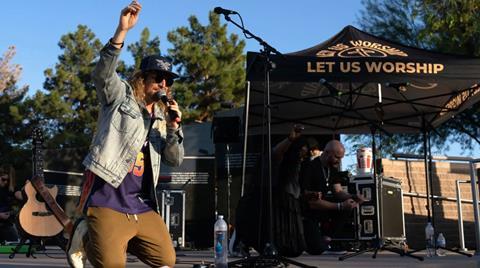Eight Canadian cities have revoked performance permits for the worship leader Sean Feucht. But contrary to what he claims, the songwriter is not being persecuted for his faith, argues Elias Dummer

Canadians aren’t buying what Sean Feucht is selling. Neither am I.
See, in the early 2000s, at a high school in Hamilton, Ontario, being a Christian was, for a brief moment, punk rock.
Some friends and I had started a small Christian lunchtime group. Harmless but earnest, we met weekly to pray and build community. We had school approval and the group grew from four to 20 students without issue.
Then a new principal arrived. She banned the group, citing “aggressive proselytizing”—a charge she never witnessed firsthand. The ban came during Ramadan when Muslim classmates — many our friends — could leave class to pray with their Imam in a dedicated classroom. Naturally, it became an issue.
The story gained local and national attention. Our group met outside in the winter and a nearby Tim Hortons brought hot chocolate. The pastor who helped us made the news. The group only grew.
Several students from that sidewalk protest would go on to become pastors and now serve freely in Canada, a nation which, contrary to what Feucht now claims, enjoys the benefits of religious freedom.
But here’s the point:
No one monetised it, no one built a brand and there were no merch tables or donor appeals.
Canadians rallied around us because it was clear: a principal’s personal bias had driven an institutional decision. The school board reversed the ban, and life returned to normal. In other words, the system worked. I learned something important: when religious liberty is genuinely threatened in Canada, Canadians will defend it with elbows up.
That’s how a shared society should work. And that’s the issue at hand: a shared society.
A different cause
Today, a different kind of religion is gaining ground — one that thrives on outrage, builds financial empires on grievance, and cloaks political ambition in sacred language. This isn’t faithful Christianity. It’s a modern political project known as Christian Nationalism. Sean Feucht’s public record fits squarely in that territory.
In recent years, Feucht has been touring under the ‘Let Us Worship’ banner, and claiming that religious freedom is being restricted in the USA. His message has proven popular, and resulted in millions of dollars of donations pouring into his ministry (more on that later).
But here’s the problem: throughout the West, including in both Canada and the United States, free expression — especially when framed as religious — enjoys broad legal protection. That protection is vital when faith is genuinely at stake. But it can also create a shield for conduct that, absent the religious packaging, might look like deceptive fundraising.
I recognise the patterns. I spent much of my adult career in the worship music space — writing, recording, and touring across North America. I’ve seen both the beauty and the dysfunction from the inside of machines like the one he captains, and from that vantage point, what Feucht is doing is both familiar and deeply troubling.
In several Canadian cities, residents have exercised their right to petition against his rallies being held in public parks. In some cases, those petitions succeeded. For obvious reasons, debates are now underway about whether this amounts to a “heckler’s veto.” But what it is not is the persecution of Christians in any meaningful sense. Churches meet weekly, and more, from coast to coast. Other Christian music tours travel across Canada without interruption—I’ve done it myself. Meanwhile, Sean cries wolf.
Why did so many Canadians oppose Feucht’s concerts? Because in this moment marked by global instability and efforts to export American Nationalism, his work appears far more aligned with political and financial ambition than with earnest faith.
At a previous event, Feucht openly owned the term ‘Christian nationalist’. Imitating his critics’ tone, he said, “We get called — ‘Well, you’re a Christian nationalist: you want the Kingdom to be the government!’ Yes!”, “‘You want God to come and overtake the government!’ Yes!”, “‘You want Christians to be the only ones —’ Yes we do!”
Financial, spiritual and moral allegations
Recent investigative reporting by The Roys Report revealed Feucht’s nonprofits purchasing high-value properties — some listed as parsonages — later found on short-term rental sites. Five of his former colleagues have also provided evidence on truthandfreedomstories.com of Feucht’s unethical handling of donations, poor treatment of staff and volunteers and dishonesty in the way he presents himself in the media.
In my city and others, crowd sizes have been inflated online to tell a revival story that plays better for donors than the facts. I’ve repeatedly heard firsthand reports of volunteer mistreatment and disillusioned supporters.
I’ve even heard firsthand accounts of Canadian events being staged for effect. At one nearby Ontario gathering, a turban-wearing security guard was pulled onstage for an attempted photo op to be posted online as a “salvation moment.” According to a witness, there was no conversion at all, only confusion and anger from the unwilling participant. But that didn’t matter. The image would have served its online purpose. According to the witness, Sean ensured the cameras were rolling.
Character matters
To question the actions, finances, and truthfulness of a ministry leader isn’t slander. Slander is knowingly spreading false claims. Gossip is unverified private chatter. What I’ve described is neither — it’s public record and eyewitness testimony. This is not rumour. It’s scrutiny.
In faithful Christian ministry, character is not optional — it’s central to the claim.
If you care about the church — or about democracy — it matters when political theatre wears the garments of worship. When lyrics twist scripture for the refrains of power, it demands serious scrutiny. It deserves to be challenged head-on.
Why the persecution narrative is useful
For Sean, the persecution narrative is a feature, not a bug. It drives the story. It fuels the donations.
What’s strange is that beyond holding worship events and posting statements on his own platforms, Feucht has done no substantive religious freedom advocacy in Canada. No legal challenges. No formal submissions. No work through Canadian human rights channels. In five years, he has made no tangible legal effort to pursue his cause. The persecution narrative becomes a closed loop: support the tours, so he can claim persecution, so he can do more tours.
So, no — Sean Feucht is not being persecuted in Canada for his faith. He’s facing the consequences of his choices to engage in unethical behaviour and put his politics front and centre of his ministry. And by all available evidence, he’s been well compensated for it.
I think it’s fair that the many Christians freely practicing their faith in Canada can say: enough is enough.


































